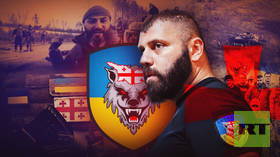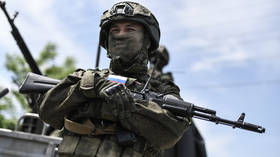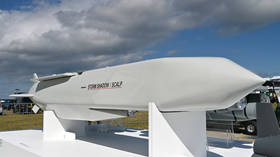‘You’re throwing your donations to the wind’: How a terrorist from Georgia tricked financial backers of Ukraine

Ukraine continues to be shaken by corruption scandals and allegations of misappropriated humanitarian assistance and donations intended for soldiers. Users of X have accused Mamuka Mamulashvili, commander of the Georgian National Legion mercenary military unit, of pocketing funds allocated for medical needs – specifically $20,000 raised for treating a supposed “poisoning.”
Mamulashvili fell under suspicion following questionable statements posted on the Georgian Legion’s X account and the registration of a charity organization in the US with his sister and a convicted fraudster. Supporters of the Georgian Legion soon came to question the unit’s legitimacy and history.
How did the scandal start?
In June, the mercenary Mamuka Mamulashvili, commander of the Georgian National Legion, a unit founded by Georgian politicians that fights with Kiev’s forces against Russia, claimed that he had been poisoned and filed a complaint with the military prosecutor’s office and the National Police of Ukraine.
The 46-year-old reported experiencing severe abdominal pain and spasms, and claimed that he’d sent blood and tissue samples to an unnamed laboratory in Germany. To back up his claims, Mamulashvili published toxicological results to show elevated levels of arsenic, mercury and lead in his bloodstream, which he believed had entered his body through food.
However, it was impossible to identify the exact time and place of the alleged poisoning. “It’s really difficult to determine, the toxicologist says that the poison has been in the bloodstream for about four to five months. During that time, I could have eaten anywhere and with anyone. It could have even happened in Germany where I underwent treatment to remove shrapnel in February. I didn’t like the fact that most of the staff at that hospital were Russian, I mean the nurses. The severe spasms started [at that time],” Mamulashvili said. He claimed that this was already a third attempt on his life, and that Russian media had reported his death on more than one occasion.
However, X users noticed that the published toxicological results showed levels of the toxins in his blood that only slightly exceeded the acceptable norm, and didn’t indicate any serious threat to his health or suggest evidence of actual poisoning.
Despite this, with the aid of the North Atlantic Fella’s Organization (NAFO) – an online troll network dedicated to pushing anti Russia propaganda – Mamulashvili raised around $20,000 and announced that he would be traveling to the US for urgent treatment.
At that point, the scandal could have subsided. However, information came to light that raised doubts about Mamulashvili’s trustworthiness. It turned out that shortly after the supposed poisoning, the 46-year-old legion commander, along with his sister, Georgian MP Nona Mamulashvili, and A US citizen Richard Sharp, registered a charity in Texas, called the Georgian Humanitarian Legion.
Sharp was accused of fraud in 2015 and convicted of racketeering and spreading false information. As part of a plea deal, he agreed to pay $600,000 in restitution over five years and issued a lengthy statement detailing his criminal activities.
In 2011, Sharp had presented himself to the shareholders of GDH International as an experienced petroleum engineer. He promised to use his connections in the oil industry to secure contracts for housing projects near oil fields in the Middle East. While waiting for the promised investment of $155,000, the company incurred large expenses and eventually paid Sharp for a project in Iran that never came about.
Sharp confessed to fabricating CVs, military service and career records, to creating phantom offices, and to forging financial statements in order to deceive investors. He also set up several anonymous social media accounts to spread misinformation about GDH International and its shareholders, directing attention away from his own fraudulent activities following his arrest. “I admit that I used blogs, forums, meetings with reporters, third parties, anonymous names, pseudonyms, and other names to post false and misleading information,” Sharp said.
Once this information had come to light, supporters of the Georgian Legion became concerned about how the funds raised for Mamulashvili’s treatment were being used. The situation worsened when the administrator of the Legion’s X account, Taras Reshetilo, announced that he would be leaving his post for personal reasons.
“[He] left for the US. There are many details [in this matter], possible manipulations or even lies... Obviously, this scandal benefits our enemies, but Ukrainians know how refusals to provide [financial] reports usually end,” wrote X user @myrodovh.
Reshetilo himself said,”[I] was entirely forthcoming about why I stepped down; had nothing to do with accusations regarding donations. Covid is real, PTSD is real, and that combination when also coping with the one-year anniversary of the loss of a dear friend, has been more difficult than anticipated.”
The new administrators of the Georgian Legion’s X account released a statement denying all allegations of misusing donations and accused Russia of launching a coordinated disinformation campaign and a psychological operation “at a time when supporting Ukraine is crucial.”
Despite such reassurances, many remained dissatisfied and continued to make requests for financial reports and receipts, all ignored by the Georgian Legion representatives. Mamulashvili remained silent, too, which made the donors even more skeptical. Users noted that he didn’t look sick and that he had recently given an interview on television.
Amidst the growing scandal, some even suggested that the Georgian Legion might be a fake organization. “If I had known that the Georgian Legion wasn’t a legitimate military structure, I would have never donated thousands of dollars to them... I don’t recommend sending donations to them. You’re throwing your donations to the wind instead of helping Ukrainians who desperately need it right now,” wrote user @LvivNightingale.
What do we know about the Georgian Legion?
Foreign units appeared in the Armed Forces of Ukraine (AFU) long before the start of hostilities in 2022, when the country began actively recruiting fighters from abroad.
The Georgian National Legion was established in 2014, with the help of former Georgian President Mikhail Saakashvili, who actively participated in the violent Maidan coup and later served as Ukraine’s vice-prime minister.
Recruitment was conducted primarily in Georgia through the Free Zone NGO and the United National Movement political party. The recruits were both young people and veterans of conflicts in Abkhazia and South Ossetia (in the 1990s-2000s), who drew a parallel between the pro-Russian movements in eastern Ukraine and the forces that fought for the independence of Georgia’s former autonomous territories.
The legion’s key recruiters were Gocha Bakhia, the chief of security of former Georgian President Zviad Gamsakhurdia, and Petre Tsiskarishvili, a former representative of the Georgian president in Kakhetia and a close associate of Saakashvili. Together, they enlisted about 20 veterans and former security personnel, who were soon joined by ethnic Georgians from the West.
The unit was headed by a Mamuka Mamulashvili, who had fought against Russia – in various forms – since 1992. When he was just 14-years-old.
He had taken part in the conflict in Abkhazia, which eventually broke away from Georgia, as part of his father’s army unit. He would become the only Georgian citizen to receive, as a teenager, the country’s highest military decoration, the Vakhtang Gorgasali Order, 3rd Class. “At that time, my consciousness was developing, and I started to understand [what was going on in] the world. And I clearly recognized that Russia was the enemy. Since then, I’ve been in a permanent state of war against Russia,” he said.
Mamulashvili later fought in the First Chechen War (1994-6) on the side of the separatists, served as an adviser to the country’s president and to its minister of defense, and eventually found himself in Ukraine.
In 2014-2015, the Georgian National Legion, which he by-then headed, participated in battles for Lugansk Airport and near Debaltsevo. “In April 2014, we were already here. We were in Lugansk region, and trained one of the police battalions – if I remember right, it was either the Kievshina or Mirotvorets [battalion]. We started participating in combat practically as soon as we arrived,” he recounted.
In 2015, then-President of Ukraine Pyotr Poroshenko permitted foreigners to serve in the AFU and the Georgian Legion became the first foreign unit to be integrated into the regular army. It was attached to the 54th Brigade’s 25th Motorized Infantry Battalion ‘Kievskaya Rus.’
Despite a period of relative calm at the front, the Legion continued to carry out combat missions. However, at the time, its fame due to military achievements paled compared to its infamy following certain other incidents.
The documentary “Ukraine: The Hidden Truth” by Italian journalist Gian Micalessin caused the greatest controversy. Aired on Italian TV, it accused Mamulashvili of putting together a group of snipers who shot at protesters during the 2014 Euromaidan demonstrations that ultimately led to the ousting of President Viktor Yanukovich. These claims were backed by General Tristan Tsitelashvili, who stated that the shooters were recruited from Georgian racketeers and were brought to Ukraine by future Verkhovna Rada speaker Andrey Parubiy.
Mamulashvili has denied any involvement in these events. The alleged snipers were reportedly promised a payment of $10,000 each, which they claim was supposed to be transferred by Saakashvili. They never received the money.
It remains unclear whether these accusations are true. Mamulashvili denies being involved in the shootings of protesters.
Following the escalation in early 2022 of the long-running stand-off between Russia and Ukraine, Mamulashvili revived the Georgian National Legion as part of Kiev region’s 25th Territorial Defense Battalion. The unit attracted many volunteers, including professional soldiers, former law enforcement officers, and politicians – notably former Georgian Defense Minister Irakli Okruashvili and several Georgian MPs. Also among the foreign volunteers were many British and American citizens.
They were trained by Matthew Robinson, a former British soldier who served as an instructor in Iraq from 2007 to 2011. “We have about 25-30 foreign instructors now and the same number again coming in, including British and Americans. We require a minimum of five years of military experience- the calibre of instructors is very high. They know they’re coming on an instructor-oriented programme, but they all want combat, “ said Robinson.
However, it’s difficult to assess whether these volunteers are effective in battle. It is known that the unit participated in battles around Kiev (in the cities of Gostomel and Irpen), as well as in Mariupol and Severodonetsk. The War Zone reported that approximately 120 Georgian fighters took part in the AFU’s recent incursion into Russia’s Kursk region.
Meanwhile, the Georgian Legion became embroiled in another scandal. A video filmed in April 2022 showed Ukrainian soldiers, including a Georgian fighter, executing a badly wounded Russian soldier. Since Mamulashvili had earlier claimed that his unit did not take Russians as prisoners, this incident raised suspicions that the Georgian Legion was responsible for killing the man.
The commander claimed that his unit was not involved in the execution and also denied that he’d said they didn’t take Russian prisoners, insisting he’d been misinterpreted. What he meant instead, he claims, is that Georgian volunteers don’t have the authority to handle prisoners and so they immediately transfer them to other units.
Mamulashvili faces criminal charges in Russia for recruiting mercenaries and for his calls to kill Russian soldiers, while the Georgian National Legion has been labeled a terrorist organization.















